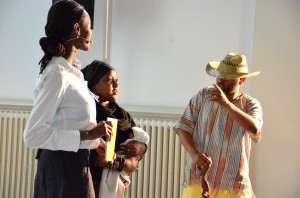Edutainment programs – an important and relatively untapped resource
I finally made it to Bonn, Germany, to attend the Deutsche Welle Global Media Forum (GMF) on education, culture and the media. This week I will be writing my blogs from here on the diverse topics around this main theme.
So far the conference has been interesting. I attended one of the workshops dealing with fun ways to learn, hosted by the Deutsche Welle Learning By Ear (LBE) program. I think the LBE program offers a great way to learn using formats such as features and radio dramas. I have attended the Global Media Forum two times before, and I found this particular workshop very entertaining. Normally the workshops consist mainly of PowerPoint presentations and talks. In this workshop, we watched one of the radio plays scenes being dramatized live just so the audience could get a taste of how the plays are conceived – although of course they are mostly radio/audio.
I also sat on the panel for this workshop because of my work with youth in Kenyan slums where we develop similar formats for audiences in informal settlements. Joining me on the panel was a LBE representative from the DW Afghanistan department. He talked about the importance of such formats for places like Afghanistan, where sensitive topics such as sexuality and even the role of women and men in society are not for open discussion. Using edutainment formats to transmit messages and inform the public is therefore a very effective method of communicating. He mentioned that even the listeners do not realize that they may be learning along the way. They probably would not even describe the radio shows as education but simply as entertainment.
In Africa, just like in Afghanistan, this media format is such a viable method of transferring information. Many people in Africa, for example, have access to a radio or a mobile phone but – surprisingly – these same people may not have any access to educational offerings. Media can bridge this gap, so they get at least some form of education using the devices they have.
LBE tackles several topics from health, Education, gender, culture, technology, youth and unemployment among others, and the production team decides on a topic after several brainstorming sessions and doing research. After the topics are decided, writers from the focus regions turn the ideas into scripts, which are then dramatized using actors from these regions. Later, after post-production, they are broadcasted by DW partner stations and other interested media.
I think edutainment formats such as these remain a largely untapped resource for transmitting information. They require extra work and time that go beyond the standard curriculum followed by schools, therefore they take a bit of open-mindedness from educators. Nevertheless, the education sector can take advantage of this by using it either as an extra method for educating or integrating it into what already exists in school curriculums.





